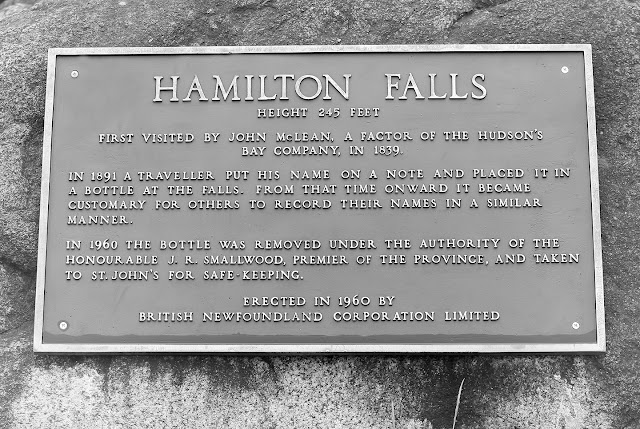'Do-or-die condition' - Power Struggle Part 4 of 12
Memorial professors reveal questionable Hydro-Quebec tactics in landing Upper Churchill deal
“It’s quite the story. A story that leads to substantial questions of, I think, business ethics — if not law.”
— Jim Feehan, a Memorial University economist and co-author of a report documenting the last minute 25-year extension to the Upper Churchill contract.
Fourth in a 12-part series.
The defunct weekly provincial newspaper, The Independent (2004-2008), carried out extensive research and investigation into the Upper Churchill. From the contract’s signing in the 1960s, to the realization of its incredible lopsided nature towards Quebec, the shadow of the deal looms today over the potential development of Labrador’s Muskrat Falls. The following is the 4th in a series of 12 articles published in The Independent.
By Clare-Marie Grigg
The Independent
Dec. 11, 2005
The 65-year Upper Churchill contract, that will see Quebec make as much as $2 billion this year in profit compared to $32 million for Newfoundland and Labrador, was signed as the result of a last-minute, gun-to-the-head, non-negotiable demand by Hydro-Quebec.
According to a soon-to-be released paper by two Memorial University professors, the Upper Churchill contract originally promised relatively reasonable terms until Hydro-Quebec realized the company in charge of the development — the Churchill Falls (Labrador) Co. (CFLCo) — was bordering on bankruptcy.
At that point, Quebec altered its demands concerning a renewal clause, insisting on an automatic 25-year extension.
CFLCo was forced to agree — or fold, taking the already well-underway Upper Churchill project with it.
Shortly afterwards, CFLCo’s top two negotiators were killed in a Labrador plane crash and another senior member of the company’s negotiating team resigned in grief.
Details surrounding the Upper Churchill contract then fell by the wayside.
James Feehan, an economist and co-author of the paper, tells The Independent he and his colleague, historian Mel Baker, uncovered the facts behind the signing of the Upper Churchill by examining archived material, as well as from filling official Freedom of Information requests with the provincial government.
“It’s quite the story,” Feehan says. “A story that leads to substantial questions of, I think, business ethics — if not law.”
“No one knew what happened, you have to remember that after this negotiation, the CFLCo negotiations, two of them were killed in a plane accident.
“When I get the paper done I think it may open some eyes. Essentially I think it knocks away some of the myths.”
Some details exposed by Feehan’s paper include the fact the Upper Churchill contract was originally set to be renegotiated in 2016; CFLCo was completely aware of the importance of escalators (which are absent from the contract, meaning Hydro-Quebec gets fixed, low-rate power for 65 years); and then-premier Joey Smallwood was not part of negotiations and had no power to stop CFLCo signing the contract, due to the fact the then-privately owned company leased the Churchill water rights.
“The most outrageous aspect, really the truly inequitable aspect of the Churchill Falls deal, is the renewal clause,” says Feehan. “Something quite opposite to it was agreed to, from ’63 right up to the last minute and in the signed letter of intent. It was an entirely different agreement when it came to renewal … it was a substantial deviation.”
The original renewal clause allowed for a renegotiation between the parties in 2016 (44 years after the first power or 40 years after the project completion, whichever came first), with a further 25-year extension only occurring following a mutual agreement.
The change Hydro-Quebec later demanded for the clause resulted in a non-negotiable 25-year renewal in 2016 — which is why 2041 is now the date considered as the culmination of the contract.
In 1966, Hydro-Quebec issued its formal letter of intent (containing the original renewal clause) to take the financial development risk of the Upper Churchill, control transmission through its own province and buy the power from Newfoundland and Labrador.
Feehan says that letter was looked at as an unsigned contract, a contract with generous terms for Quebec, although not unconscionable given the risk of such a massive project.
CFLCo and the province agreed to the terms, including the 2016 expiration date.
CFLCo and the province also agreed to sell the power to Quebec at a fixed, inflation-free price that Feehan says even in 1968 was considered low.
They agreed to the terms — not because they didn’t understand the need for an escalator clause — but because Hydro-Quebec, in return, would undertake to ensure CFLCo didn’t go bankrupt.
As far as CFLCo and the province were concerned, it was a price worth paying to ensure the development of the massively expensive project would fall right back into Newfoundland’s hands in 2016.
CFLCo sunk all the money into the beginning of the project in the mid 1960s, realizing Quebec required the power by 1972 and that the financial risk would be relieved by Hydro-Quebec as soon as the official contract was signed.
By that time, Hydro-Quebec had wrangled control of a 20 per cent share of CFLCo, which had originally been held by a privately owned Quebec company.
Despite protests of a conflict of interest from CFLCo and Smallwood, Quebec refused to sell those shares back to CFLCo’s parent company, Brinco.
By 1968, Brinco, Quebec, and Newfoundland and Labrador all had shares in CFLCo.
That meant Hydro-Quebec insisted it would continue to purchase the power at a similarly low, fixed rate. That rate equals out to less than one quarter of a cent per kilowatt hour (today that power is worth as much as nine cents per kilowatt hour).
“People have always talked about the contract as if it was a uniform 65-year contract,” says Feehan. “People have always said, well there was no re-opener clause or people didn’t understand the need for escalation, didn’t know about inflation. These people understood these notions, they understood it; it’s just that when it came to the crunch, Hydro-Quebec said no.
“(CFLCo) were aware of all these things and basically they were at a point, financially, where they really were facing a do-or-die condition. This was put on the table and it was essentially non-negotiable.”
Hydro-Quebec now owns 34 per cent of CFLCo; the province and Newfoundland and Labrador own the remainder, purchased when Frank Moores administration bought Brinco shares in the 1970s.



Comments